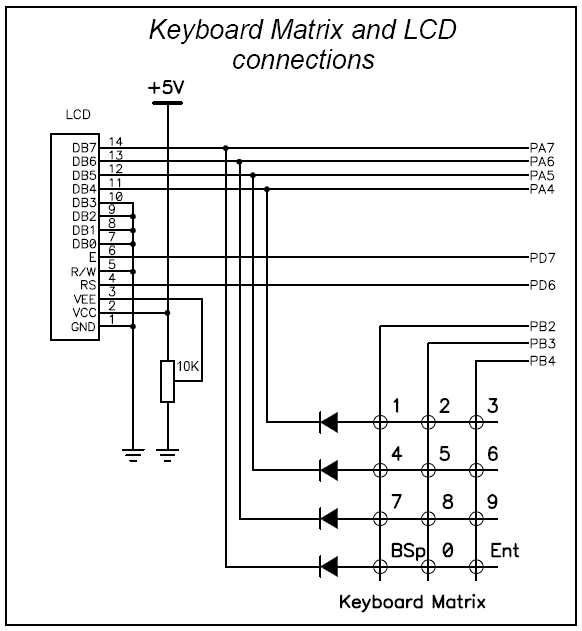|
Matrix keypad and symbol LCD for BASINT
BASINT version 2.3A for ATMEGA32 can operate with the matrix keypad and the symbol LCD.
The I/O process for keypad and LCD uses the same command as the console I/O (PRINT, INPUT, INKEY,WAITKEY).
The commands INITKEY, INITLCD were added to hardware initialize.
The function CHN() was added to switch channels of I/O.
LCD and KEYPAD connections

Action:
Sets needed channel of I/O and returns zero
Synrax:
var=CHN(channel)
It is allowed to write:
CHN(channel)
PRINT [list;] CHN(channel); [list]
The parameter channel can accept values:
0 - console I/O
1 - reserved
2 - output on LCD / input from matrix keypad
Action:
Initializes the system to work with the matrix keypad.
Syntax:
KEYINIT
Action:
Initializes the system to work with LCD.
Syntax:
LCDINIT mode
The parameter mode can accept values:
0 - single line display with consecutive addressing
1 - single line display but after the 7-th symbol the address in LCD RAM is 0x40
2 - two and more lines display
The display shows the symbols typed by the command PRINT. If the input stream has control ANSI sequence
opened by symbol 27 (0x1b) the input parser recognizes valid commands and performs them.
The valid commands are shown below.
Control ANSI sequences
ESC - symbol with code 27 (1B - in hex)
Control sequence |
Action |
ESC[2J |
Clears display and sets cursor at row=1, column=1 |
ESC[<row>;<column>f or
ESC[<row>;<column>H |
Sets the cursor position at row, column |
ESC[f èëè ESC[H |
Sets the cursor position at 1,1 |
ESC[<n_shifts>C |
Shifts cursor the n_shifts times to the right |
ESC[C |
Shifts cursor to the right |
ESC[<n_shifts>D |
Shifts cursor the n_shifts times to the left |
ESC[D |
Shifts cursor to one position to the right |
Non-standard control sequences
Control sequence |
Action |
ESC0D |
Hides the cursor |
ESC0Ñ |
Shows the cursor |
Some actions upon some single symbols
Symbol |
Action |
0x08 |
Shifts cursor to the left |
0x0A |
Ignored |
0x0Ñ |
Clears display and sets cursor at row=1, column=1 |
0x0D |
Ignored |
The sample below shows how use ANSII sequences. Note that clear screen operation is not too fast.
Insert delay after clear screen operation.
cls
delay 100
print at(1,1);"ADC #1 ";
print at(1,2);"ADC #2 ";
10 x = adc
setadmux 0
print at(9,1);x;" "
y = adc
setadmux 1
print at(9,2);y;" "
goto 10
_________________________________
By
Alexander Kostyuk ua6ann@mail.ru
Evgeny Fadeev rv3bj@hotbox.ru
|
